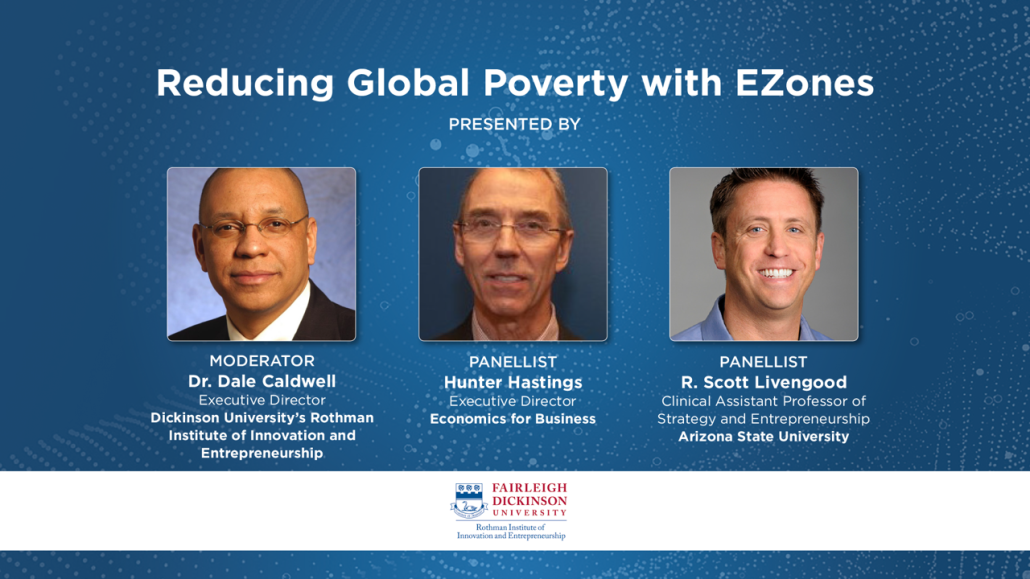The EZones Movement Unites Entrepreneurs In Shared Citizenry Of The World.
In a panel at the G7-G20 Group Of Nations Summit on Solutions Through Inclusivity, Dr. Dale G. Caldwell expressed concern at the division we are experiencing in today’s society. It feels, he said, as if every choice today is your side versus my side, your party versus my party, your ideology versus my ideology.
But Dr. Caldwell has an insight that points the way to transcending this impasse, and avoiding this collision.
His insight concerns the global energy of entrepreneurship. He is the originator of the concept of Entrepreneurial Zones or EZones, place-based accelerators of economic growth and community prosperity based on harnessing the energy of entrepreneurship rather than the dependency of welfare and charity. The EZones concept can apply anywhere in the world to raise the economic productivity of communities, and to improve lives.
The entrepreneurs who supply the energy, as individuals, groups, teams, firms, and networks, are unified in the principles and practice of creating value. Entrepreneurship is a producer-customer value collaboration. In today’s interconnected world, the customer might be on one side of the globe while the producer is on the other, or the interaction could take place in a village marketplace. It’s all entrepreneurship.
The entrepreneurial citizens of the world are united not only by their common economic interests, but also by a set of shared human values. Entrepreneurship is an elevated form of interaction between people that rests on proud foundations.
Caring.
Entrepreneurs demonstrate caring for their customers. They know that their customers are seeking to improve their own circumstances, whether in nutrition, connection, access to technology, availability of services, medical care, or any other field of life improvement. Because they care, entrepreneurs can identify new ways to reach higher ground for these customers, and make them a promise of better times ahead. They supply to meet others’ demand and to help them find value in a new and better experience.
The same caring extends to the community in which they operate. Entrepreneurs raise standards so that others can raise their expectations.
And entrepreneurs care for themselves, aiming to achieve their own highest values in the pursuit of value for others.
Concern.
What economists call demand can be characterized as people wishing that things could be better. They are dissatisfied, uneasy. Entrepreneurs feel concern for this condition, and they develop a passion to eradicate it, and take responsibility for trying to succeed in doing so.
The entrepreneurial role of improving others’ lives stems from this concern. Without it, we would not expect to see the amount of entrepreneurial energy that we do – the unrelenting effort to innovate and improve.
Empathy.
For caring and concern to be directed at the right goals and at the highest and best outcomes for customers, entrepreneurs look to their own powers of empathy – to truly understand and sympathize with the innermost feelings of others. Empathy enables entrepreneurs to identify what’s important to customers and why, and to understand what tradeoffs they’ll make to substitute a new set of circumstances for the one they experience today.
When customers rank some preferences higher than others, or make comparisons between one choice and an alternative, it is empathy that helps entrepreneurs evaluate, and guides them in designing and shaping just the right solution to the customer’s felt but unarticulated need.
Empathy is the entrepreneur’s number one skill, wherever in the world they operate.
Humility.
To be empathic requires humility, the suppression of one’s own ego-based certainty for the process of discovery of what’s right for the customer. The entrepreneur does not instruct the customer, or impose any conditions on them, or set unreasonable requirements. The entrepreneur asks and inquires, seeking to understand, to get on the customer’s wavelength, to understand their mindset. They design their products and services in the humble desire to be of value.
Dependability.
The entrepreneur is a promise-maker and a promise-keeper. The promise to make life better and to be of value must be viewed as credible. The customer must feel able to depend on the producer. There must be trust, and a reputation must be earned. Entrepreneurs understand this, because it shows up in their P&L. What is sometimes referred to as goodwill or brand equity is, in fact, the trust and reputation that are the product of dependability.
Universalism.
These characteristics and traits of entrepreneurs are true the world over, whatever the local history or norms or culture or institutional framework. Entrepreneurs treat everyone as a customer, and therefore they grant them the same high status, whatever physical differences there may be.
In fact, entrepreneurship itself is an institution – a set of shared global norms about value and production and trust and interactive collaboration. Entrepreneurship is a unifying code of conduct, a binding pact between producers to strive for the best way to serve customers, and among customers to collaborate in the co-creation of value by demanding the best from every producer.
Dr. Caldwell’s insight is that all the world’s entrepreneurs share citizenship through this institution. There is no division. All entrepreneurs are striving toward the same goals, but there is no animosity in the rivalry to serve customers in the best way. There is shared learning, since outcomes are freely observable for all to analyze and interpret. There is innovation that enables one producer to leap ahead, but only temporarily until the next response shuffles the leaderboard while raising everyone’s capacity. The dynamics of entrepreneurship result from the shared energy, the shared desire for continuous improvement.
Let’s celebrate this citizenry of the world, and repress the politicians’ desire to divide us. Their incentives are not entrepreneurial, and we should isolate them in their arena of hate while the rest of us join and support EZones as a worldwide movement to nurture and cultivate the shared human values and unlimited collaborative potential of entrepreneurship.
